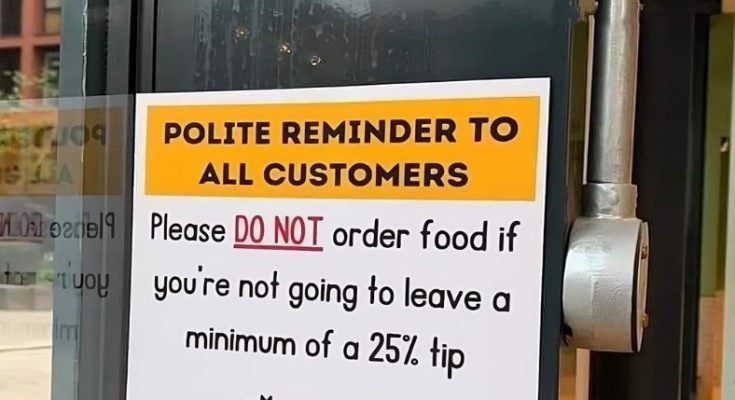Tipping has long been a cornerstone of service culture in the United States, originally intended as a way to reward exceptional service. But over the years, what began as a token of gratitude has morphed into a divisive issue. Today, tipping often feels more like an obligation than a gesture of appreciation, raising questions about its fairness and relevance in modern times.
The Original Intent of Tipping
Tipping originated in 19th-century Europe as a way to reward service workers who went above and beyond. The concept made its way to the U.S., where it initially served as a bonus for exceptional performance. Customers felt they were acknowledging great service, and workers saw it as a chance to earn extra income.
However, tipping has strayed far from its original purpose. Many industries now rely on tips to subsidize low wages, making tipping less about rewarding quality and more about filling gaps left by inadequate employer pay.
Dustin Anderson’s Take on Tipping
Dustin Anderson, a vocal critic of tipping culture, recently went viral for questioning its modern relevance. “When was the last time you got exceptional service, anywhere?” he asked in a social media post. Anderson argued that tipping has become an expectation, regardless of service quality.
“They bring you the bill and just expect you to add 20 or 25 percent,” he explained, lamenting how tipping now feels disconnected from rewarding excellence. Anderson’s comments resonated with many, with supporters calling tipping “out of control” and questioning why they’re expected to tip for services like coffee or takeout.
Defending the Importance of Tipping
Despite growing frustration, many still defend tipping—especially those who have worked in the service industry. For these individuals, tips aren’t just bonuses; they’re a crucial part of their income.
“As a former server, we had to pay to serve people who didn’t tip,” one commenter revealed, referencing the practice of tipping out to support staff like bussers and bartenders. Many argued that the real issue isn’t tipping itself but employers who underpay workers, forcing them to rely on tips to make ends meet.
“Try being a waiter and see if you still feel the same,” one defender of tipping suggested, pointing out the physical and emotional toll of service jobs.
Why Tipping Feels Overwhelming
Modern tipping culture has expanded far beyond its original intent. Customers are now bombarded with tipping requests at coffee shops, fast-food counters, and even self-checkout kiosks. Delivery services have added to the controversy, with viral stories of drivers refusing orders or mishandling deliveries due to low or no tips.
One particularly divisive moment featured a woman explaining why she didn’t tip her home-based hairdresser: “She doesn’t commute or have overhead costs. How many people are making $40 an hour?” While some agreed, others argued that tipping remains essential in service-based industries.
The Troubling History of Tipping
Tipping in the U.S. has a problematic history rooted in racial inequality. After slavery was abolished, employers used tipping as a way to justify paying newly freed Black workers little to nothing. This practice disproportionately affected women of color, embedding systemic discrimination into the foundation of tipping culture.
While racial dynamics have shifted over time, tipped workers today still face financial instability. Many earn less than minimum wage, depending on gratuities to survive. Critics argue this system places an unfair burden on customers to subsidize wages instead of holding employers accountable.
A Comparison: Europe vs. the United States
Interestingly, tipping originated in Europe but is far less common there today. In many European countries, service charges are built into the bill, and workers receive fair wages from their employers. This system eliminates ambiguity, ensuring employees are paid fairly without relying on customer generosity.
In contrast, tipping in the U.S. is a deeply ingrained cultural norm, even in situations where service quality may not warrant it. The stark difference raises questions about why the U.S. clings to a model that other regions have successfully moved past.
The Path Forward: Fixing a Broken System
Tipping culture is at a crossroads. While many agree it has spiraled out of control, opinions on how to address it vary. Some advocate for eliminating tipping entirely, pushing employers to pay fair wages and include service charges in prices. Others suggest reserving tipping for exceptional service, returning to its original purpose.
At its core, the debate is about fairness. Customers shouldn’t feel obligated to tip, and workers shouldn’t have to rely on inconsistent gratuities to make a living. A shift toward clear pricing and fair pay could create a system that benefits everyone.
Conclusion: Time to Reevaluate Tipping
What began as a gesture of gratitude has become a contentious practice. Dustin Anderson’s viral criticism has reignited conversations about the flaws in modern tipping culture and the need for systemic change.
By addressing the root issues—low wages and unclear expectations—we can move toward a fairer system. Until then, tipping will remain a divisive topic, challenging us to rethink what gratitude and fairness truly mean in today’s world.



